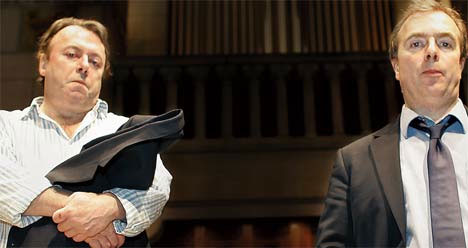Deep Reflection
[Some thoughts on Peter Hitchens’ The Rage Against God (and some great quotes) from Mark Thompson’s blog.]
I have been reading an immensely interesting book in the last couple of weeks. It is by Peter Hitchens, British journalist, author, broadcaster and brother of celebrated ‘new atheist’ Christopher Hitchens.
It is interesting for a whole host of reasons. It gives fascinating insight into life in post-war Britain and Hitchens has a number of penetrating insights into the way change has happened and why. His particular way of describing official Christianity’s slide into superficiality (aping rather than challenging what was happening all around it) challenges some of my own sacred cows. What is more, his breadth of experience in Africa, Soviet Russia, America and elsewhere adds both colour and depth to his observations.
Perhaps some of his most fascinating suggestions, though, arise in response to questions about why Christianity is so fiercely opposed at the moment, not just by enthusiasts such as Hitchens’ brother, but by opinion makers and power brokers all over the Western world. I’m fascinated if not yet quite convinced. Nevertheless, I’m certain his ideas bear further deep reflection.
Hear what he has to say:
Why is there such a fury against religion now? Why is it more advanced in Britain than in the USA? I have had good reason to seek the answer to this question, and I have found it where I might have expected to have done if only I had grasped from the start how large are the issues at stake. Only one reliable force stands in the way of the power of the strong over the weak. Only one reliable force forms the foundation of the concept of the rule of law. Only one reliable force restrains the hand of the man of power. And, in an age of power-worship, the Christian religion has become the principal obstacle to the desire of earthly utopians for absolute power. (pp. 82–3)
But what is it that they have against the Christian God? He is their chief rival. Christian belief, by subjecting all men to divine authority and by asserting in the words ‘My Kingdom is not of this world’ that the ideal society does not exist in this life, is the most coherent and potent obstacle to secular utopianism. (p. 98)
Hitchens fleshes this out in an amazing page about the significance of ‘oaths’:
… the more civilised a society is, the more power is available within it. Power cannot be destroyed, only divided and distributed. It may shatter into an anarchic war of all against all. Or it may solidify into a tyranny. Or it may be resolved into a free society governed by universally acknowledged laws. But on what basis can this be done? What agency can be used to place law above force? A law that does not stand above brute force, will not survive for long. How are inconvenient obligations, those of the banker and the messenger and the merchant, to be made binding? How are the young to [be] made to accept the authority of parents and teachers, once they are physically strong enough to ignore them, but too inexperienced in life to know the value of peace and learning?
The answer, from a very early stage, was that such contracts were made binding by solemn promises sworn in the name of Almighty God and, as Abraham Lincoln used to say of his Presidential Oath, ‘registered in heaven’. These oaths called into every contract an external power, one whose awful vengeance no man could escape if he defied it, and which he would be utterly ashamed to break. As Sir Thomas More explains in Robert Bolt’s play ‘A Man for All Seasons’, when a man swears an oath ‘he’s holding his own self in his own hands. Like water. And if he opens his fingers then — he needn’t hope to find himself again’.
In their utter reverence for oaths, men of More’s era were in my view as superior to us as the builders of Chartres Cathedral were to the builders of shopping malls. Our ancestors’ undisturbed faith gave them a far closer, healthier relation to the truth — and so to beauty — than we have. Without the oath, where is the obligation or the pressure to fulfil it? Where is the law that even Kings must obey? Where is Magna Carta, Habeas Corpus or the Bill of Rights, all of which arose out of attempts to rule by lawless tyranny? Where is the lifelong fidelity of husband and wife? Where is the safety of the innocent child growing in the womb? Where, in the end, is the safety of any of us from those currently bigger and stronger than we are? (pp. 106–7)
In other words, the claims of Christ are not just opposed to individualism, to personal moral and intellectual autonomy, they cut right across the hopes and dreams of those who have convinced themselves of ‘the greatness of humanity’ and ‘the perfectibility of human society’ (p. 101). And furthermore, by ignoring them we are not only impoverished but left more vulnerable than we could ever imagine.
The book is worth reading and, indeed, arguing with at points. But more than that. It challenges us to think about how we might engage our contemporaries in serious and honest debate about the directions in which we all seem to be headed.


























